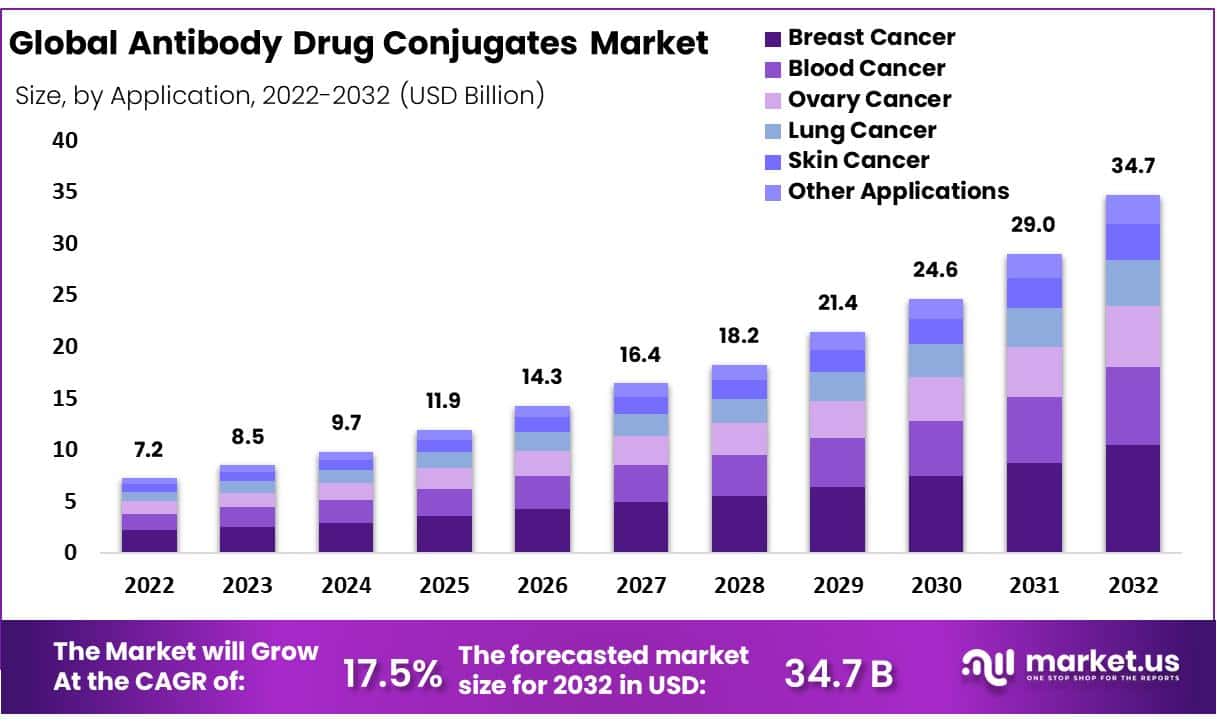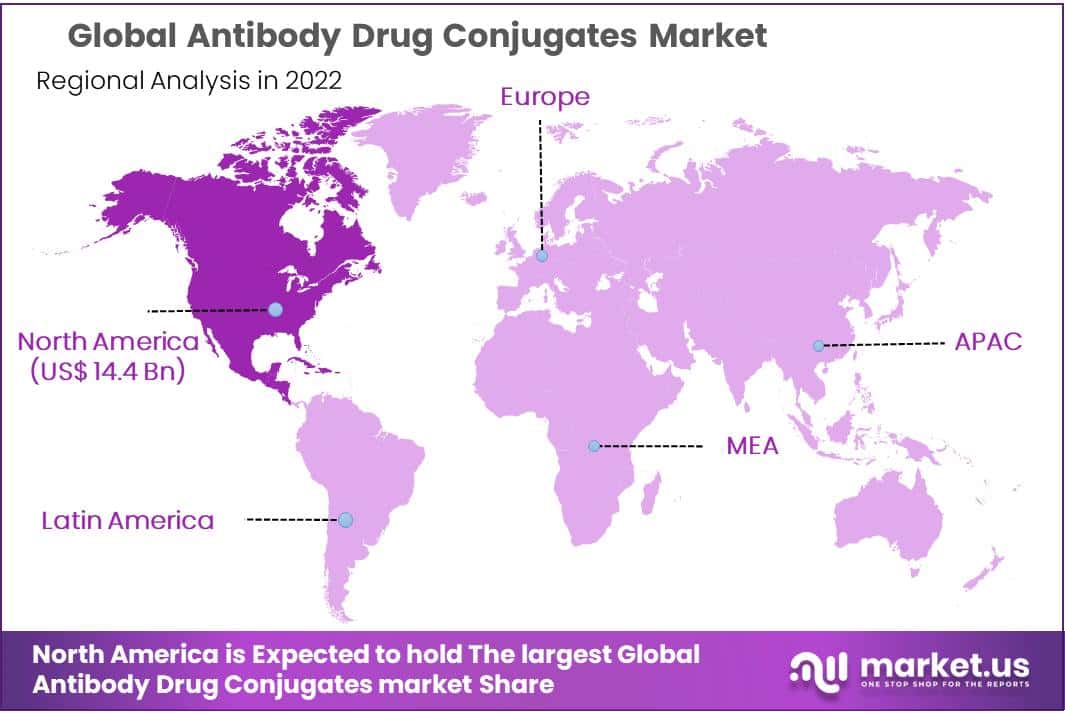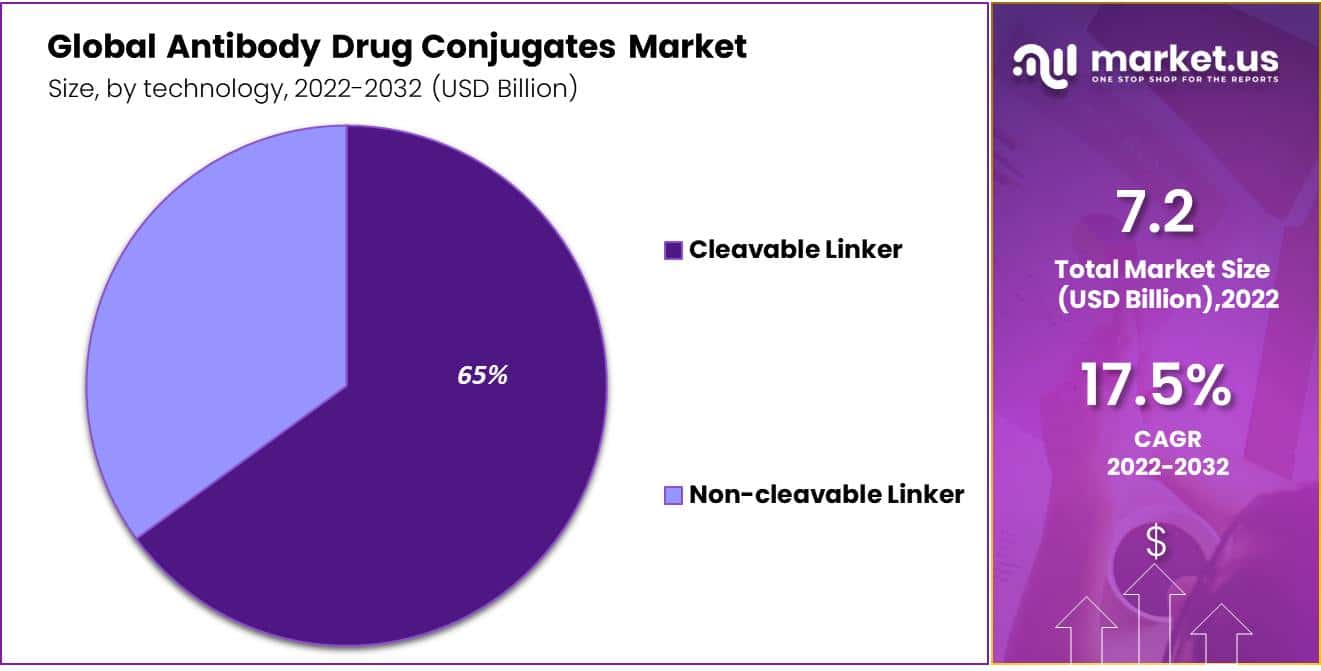New York, Sept. 25, 2023 (GLOBE NEWSWIRE) -- According to a recent report by Market.us, the Global Antibody Drug Conjugates Market size is expected to be worth around USD 34.7 Billion by 2032 from USD 7.2 Billion in 2022, growing at a CAGR of 17.5 % during the forecast period from 2023 to 2032.
The global Antibody Drug Conjugates market is mainly driven by the increasing number of cancer cases worldwide. ADCs are intended to deliver a cytotoxic payload directly to cancer cells while sparing healthy cells, making treatment more focused, efficient, and with fewer side effects. simply put, antibody drug conjugates enable targeted delivery of cytotoxic agents to cancerous cells without any harm done to normal cells. An ADC is composed of a cytotoxic substance, a monoclonal antibody, and a linker.
The monoclonal antibody recognizes and binds to a specific antigen on the surface of cancer cells. After bonding with the cancer cell, the ADC is internalized, and the cytotoxic chemical is subsequently released, causing cell death. Because of the number of patient visits declined in hospitals, the lack of Medicare insurance coverage and the COVID-19 pandemic harmed product revenue.

Market.us has identified key trends, drivers, and challenges in the market, which will help clients improve their strategies to stay ahead of their competitors. - View a PDF sample report @ https://market.us/report/antibody-drug-conjugates-market/request-sample/
Key Takeaway
- Antibody drug conjugates, also referred to as ‘smart chemo’ is a novel cancer therapy which facilitates targeted elimination of benign and malignant cancer cells, without any harmful somatic cell damage.
- One of the most prominent forces driving the market is increasing cancer incidence.
- By application, the breast cancer segment dominated the market and accounted for the largest revenue share in the antibody drug conjugates market in 2022.
- By technology, the cleavable linker segment accounted for the largest revenue share.
- By product, the rapidly increasing utilization of Kadcyla is supporting the growth of the non-cleavable linker segment.
- By end-user, the hospitals and specialty cancer centers segment dominated the largest market share.
- In 2022, North America dominated the market with the highest revenue share of 40%.
Factors Affecting The Growth of The Antibody-Drug Conjugates Market
- Increasing prevalence of cancer: Cancer is a major market driver for ADCs because they have demonstrated promising outcomes in treating a variety of cancers. The demand for efficient cancer therapeutics like ADCs is projected to rise as the incidence of cancer rises globally.
- Technology developments: The development of advanced techniques for the production and conjugation of ADCs has improved product quality and increased yields, which has further driven market expansion.
- Rising investments in R&D: The pharmaceutical sector has been spending a lot on ADC research and development, which has resulted in the identification of new targets and the creation of innovative ADCs with enhanced efficacy and safety profiles.
- Increasing approvals by regulatory authorities: The FDA and other regulatory bodies have been approving a rising number of ADCs for use in the treatment of cancer, which has further market expansion.
Regional Analysis
The market for drug-conjugated antibodies is dominated by North America, with a substantial market share amounting to 40%. Increasing healthcare costs and the introduction of novel products are significant factors in the North America. A marked increase in the demand for antibody-drug conjugates will also be seen in the expected time period. The market for drug-conjugated antibodies in Europe is the second-largest in the world. The market is expanding as a direct consequence of the increased frequency of cancer cases in the European countries, which is responsible for 25% of all fatalities in the UK.
To understand how our report can bring a difference to your business strategy, Inquire about a brochure at https://market.us/report/antibody-drug-conjugates-market/#inquiry

Scope of the Report
| Report Attributes | Details |
| Market Value (2022) | USD 7.2 Billion |
| Market Size in 2032 | USD 34.7 Billion |
| CAGR (2023 to 2032) | 17.5% |
| North America Revenue Share | 40.0% |
| Historic Period | 2016 to 2021 |
| Base Year | 2022 |
| Forecast Year | 2023 to 2032 |
Market Drivers
The primary generation of the ADCs were created in the 2000s and were only partially successful. This prompted effective production of second-generation ADCs, which after 2010s, became capable of competing in the worldwide antibody drug conjugates market. such ADCs have increased levels of cytotoxin, lesser amounts of bare antibodies, and heightened durability of drug-antibody linkers. Alternatively, third-generation ADCs, which have been used since 2019 replace random coupling with site-specific or targeted conjugation algorithms, which generate a homogeneous output by controlling the payload conjugation.
Age-related increases in cancer incidence are most caused by an increased risk of specific tumors with advancement of age. With the increasing cancer incidence, the ADC demand is enhanced. As stated in a report by GLOBOCAN 2020, cancer caused over 10.0 million deaths worldwide, with over 19.3 million new cases.
Market Restraints
The high cost of raw materials, the drawn-out manufacturing process, the requirement for a skilled and experienced staff along with adoption of technology drive up the cost of ADC production. Moreover, variations in raw material prices affect production costs. Businesses in the pharmaceutical and biotechnology sectors invest a substantial sum in R&D.
ADCs possess an effective side-effect profile because of their great selectivity. The most common side effects of ADCs include nausea and vomiting. However, this can vary depending on the antibody drug-conjugate and the supplemental payload. Stomatitis, nausea, vomiting, infection, and fever are some other side effects. These serious side effects include bleeding, low haemoglobin, possible liver damage, especially hepatic veno-occlusive disease, IRRs, and IRRs.
Market Opportunities
Due to the increasing cancer incidence along with public health concern, government authorities are prompted to invest in cancer preventative research. Furthermore, a lot of governments in underdeveloped countries are focusing on improving their healthcare systems to offer cancer patients effective treatment. The government's growing involvement in cancer prevention will improve funding for the production of antibody-drug conjugates, which will aid the market's growth throughout the expected timeframe.
Immediate Delivery Available | Buy This Premium Research Report@ https://market.us/purchase-report/?report_id=102579
Report Segmentation of the Cancer Diagnostics Market
Product Insight
The non-cleavable linker segment of the antibody drug conjugates market is experiencing pronounced growth which can be attributed to soaring Kadcyla usage. Kadcyla is a antibody-drug conjugate created with non-cleavable linker technology used for treating breats cancer. This sector is predicted to experience a marked increase. Alternatively, the High-stability non-cleavable linkers actively partake in necrosis of antigen-negative cells. Adcetris locates then terminates cancer cells and has traditionally been used to treat Hodgkin lymphoma along with systemic anaplastic large cell lymphoma. It contains brentuximab vedotin.
Application Insight
The breast cancer category is the highest contributor to the market. In this, the initial development of cancer occurs in the glandular tissue of the breast. According to WHO, over 2.3 million women suffer from breast cancer. The market is expanding as a result of an increase in the number of antibody-drug conjugates that can potentially assist in the treatment of breast cancer being approved for usage. The blood cancer segment is expected to occupy a sizable market share during the projection period. Blood cancer affects hemocytes and has a wide range of different types. It is the fifth most frequent type of cancer. Leukemia along with lymphoma have become more prevalent recently.
Technology Insight
The segment with the highest revenue share was cleavable linkers. The most preferred technology for an effective outcome of ADCs in cancer treatment is cleavable linkers because they can release cytotoxin from ADCs and remain stable in the bloodstream for a longer duration. As an illustration, the Chinese National Medical Products Administration (NMPA) approved the use of Adcetris from Seagen & Takeda in 2020 for the treatment of recurrent Hodgkin lymphoma and relapsed systemic anaplastic large cell lymphoma (sALCL). These elements are predicted to drive the market segment for cleavable linkers throughout the course of the forecast year.

End-User Insight
Hospitals and speciality cancer centers dominated the market for antibody drug conjugates and accounted for the biggest revenue share. Hospitals and specialized cancer clinics provide ADCs to patients who need particular therapy. It is vital to manage any side effects or adverse reactions, as well as to make sure that patients are receiving an appropriate amount of the ADC.
Recent Development of the antibody-drug Conjugates Market
- In June 2022, ADC Therapeutics was preparing to add camidanlumab tesirine, the second ADC, to the line-up of drugs offered by the business. Results from the medication's clinical trial's second phase were favourable. They will probably apply for FDA approval as a potential treatment for Hodgkin's lymphoma.
- In June 2022, Spirea Ltd reported receiving GBP 2.4 million in funding from investors for the creation of highly specialised ADCs for the management of solid tumours. As a result of their innovation, more medication can be supplied to the affected area to destroy cancer cells, increasing the drug to antibody ratio. This would aid cancer treatment in more ways.
- In May 2022, the FDA approved the use of Fam-trastuzumab deruxtecan-nxki (Enhertu), a medication developed to treat metastatic HER2, a type of positive breast cancer. The drug was developed by Daiichi Sankyo and AstraZeneca.
Market.us has identified key trends, drivers, and challenges in the market, which will help clients improve their strategies to stay ahead of their competitors. - View a PDF sample report @ https://market.us/report/antibody-drug-conjugates-market/request-sample/
Market Segmentation
Based on Product
- Adcetris
- Kadcyla
- Other Product Types
Based on Application
- Blood Cancer
- Breast Cancer
- Ovary Cancer
- Lung Cancer
- Skin Cancer
- Brain Tumor
- Other Applications
Based on Technology
- Cleavable Linker
- Non-cleavable Linker
Based on Target Type
- CD30 Antibodies
- HER2 Antibodies
- Other Target Types
Based on End-User
- Hospitals and Speciality Cancer Centers
- Biotechnology and Pharmaceutical Companies
- Other End Users
By Geography
- North America
- US
- Canada
- Europe
- Germany
- France
- The UK
- Spain
- Italy
- Russia
- Netherland
- Rest of Europe
- Asia Pacific
- China
- Japan
- South Korea
- India
- New Zealand
- Singapore
- Thailand
- Vietnam
- Rest of APAC
- Latin America
- Brazil
- Mexico
- Rest of Latin America
- Middle East & Africa
- South Africa
- Saudi Arabia
- UAE
- Rest of MEA
Competitive Landscape
Antibody-drug conjugates (ADCs) have a wide range of competitors, with several pharmaceutical and biotechnology companies increasingly working to create ADCs for the treatment of various diseases. The following are some of the major players:
- Takeda Pharmaceutical Company Limited
- Hoffmann-La Roche Ltd.
- Pfizer, Inc.
- AstraZeneca
- Gilead Sciences, Inc.
- Astellas Pharma, Inc.
- Seagen, Inc.
- Daiichi Sankyo Company, Limited
- GlaxoSmithKline plc
- Adc Therapeutics Saa
- ImmunoGen Inc.
- Bayer AG
- Novartis AG
- Agensys Inc.
- Concortis Biotherapeutics
- NBE-Therapeutics
- Spirogen
- Oxford BioTherapeutics
- Other Key Players
Browse More Related Reports:
- Lyophilized Injectable Drugs Market is projected to be USD 41,545.6 Mn in 2020 to reach USD 84,613.3 Mn by 2029 at a CAGR of 7.5%
- Atopic dermatitis drugs market size is expected to be worth around US$ 24.5 Bn by 2032 from US$ 10.5 Bn in 2022
- Protein Engineering Market size is expected to be worth around USD 9,329 Million by 2032 from USD 2,691 Million in 2022
- Biologics market size is expected to be worth around USD 893.83 Billion by 2032 from USD 382.81 Billion in 2022
- Alzheimer’s disease therapeutics Market size is expected to be worth around USD 24.3 Billion by 2032 from USD 4.6 Billion in 2022
About Us:
Market.US (Powered by Prudour Pvt Ltd) specializes in in-depth market research and analysis and has been proving its mettle as a consulting and customized market research company, apart from being a much sought-after syndicated market research report-providing firm. Market.US provides customization to suit any specific or unique requirement and tailor-makes reports as per request. We go beyond boundaries to take analytics, analysis, study, and outlook to newer heights and broader horizons.
Follow Us on LinkedIn | Facebook | Twitter
Our Blog:
